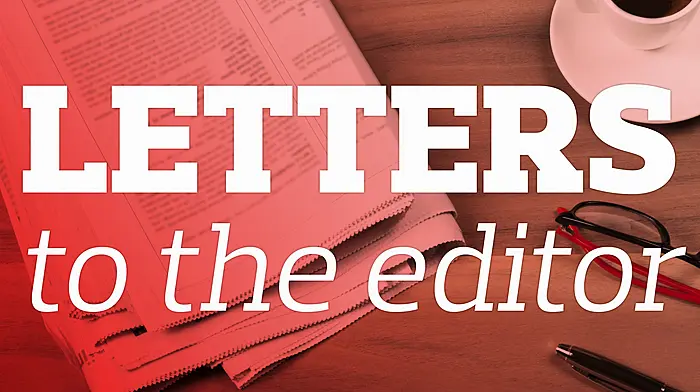EDITOR – The current concerns expressed by farmers about the knock-on consequences of the reduction in the nitrate’s derogation are well-founded, particularly in West Cork where the purchase of additional land is not easy.
Holly Cairns suggest that her constituency will be one of those most affected. Unfortunately, the concerns are based on water quality concerns only: the emissions resulting from nitrogen fertilisers applied to our grasslands represent roughly a third of all agricultural GHG emissions to the atmosphere.
The issue arises as an investigation by the European Commission’s Joint Research Council [JRC] – which is composed of 2,500 scientists ¬– has found that Ireland’s accounting for these emissions is using a ‘lower quality and higher uncertainty’ level of accounting than other agricultural or forestry activities.
Inaccuracy could have a significant impact on agriculture’s climate targets, as nitrous oxide produced by the use of nitrogen fertiliser is a major greenhouse gas that is 265 times more potent than carbon dioxide over a hundred years. The application of nitrogen fertilizer to grasslands increases nitrous oxide emissions by approximately 40%. As grasslands cover 4.1 million hectares of Ireland, the cumulative impact of any under reporting could be ‘significant’.
A letter received by our organisation recently from Director-General Kurt Vandenberghe, European Commission Directorate-General for Climate Action (DG CLIMA) in response to our concerns over the protection of organic soils says that after the JRC detailed investigation, the Directorate found that Ireland has been using a ‘Tier 1’ generic standard to assess greenhouse gas emissions from Ireland’s grasslands while forestry and other agricultural activities were fully assessed under Tier 2 and Tier 3 which require country specific crop and fertiliser impacts to be assessed.
The current head of Teagasc, Frank O’Mara, was the lead author of a paper published by the Environmental Protection Agency as far back as 2007 which investigated the impact of moving grassland emissions accounting from Tier I to 2. That study determined that in year two of their two-year research project the emission were ‘substantially higher’ than reported under Tier I.
However, citing the many variables that impact on these emissions – soil type, drainage, meteorological impacts – the 10 authors of this paper (which included the EPA and leading academics) concluded: ‘Therefore, to move from a Tier 1 to a Tier 2 approach, further data from long-term multi-site (covering a range of soil types and N inputs) monitoring studies are required’.
The new head of Teagasc’s Climate Research Centre, Dr Karl Richards, recently confirmed in response to our concerns that ‘The Intergovernmental Panel on Climate Change (IPCC) recommends where possible to use Tier 2 or Tier 3 levels of accounting in national inventories, but the use of Tier 1 does not mean the emissions are not counted in the inventory, it just means we are using IPCC default emission factors due to the absence of country-specific ones.’
And Mr. Vandenberghe’s letter – which is in the library of our website – is positive about many of Ireland’s efforts to control emissions, including low low-emission fertilisers (protected urea) and cooperation over scientific projects on wetland and organic soil monitoring.
However, the fact remains that while not belittling the implications of the loss of derogations, that is a 12% cut to the permitted derogation for nitrogen fertiliser for a limited number of farmers in a limited number of catchments. If ongoing research confirms that the nitrous oxide emissions from our grasslands are ‘substantially higher’ than we have been reporting for the last 17 years, there will be only one way to bring down agricultural emissions at the scale that will be required - reduction in intensive grass-based pasture and silage milk and livestock production.
We would urge the farming community to seek further information to inform their risk assessments as the Commission has requested that Ireland ‘prioritize the use of a more accurate method of reporting emissions’ from grasslands. The legal deadline for moving to Tier 2 and 3 reporting is, in any case, 2026.
Tony Lowes,
Friends of the Irish Environment
Eyeries.
Defence Forces need to receive proper funding
EDITOR – It is easy to relish the stupidity of the alleged drug smugglers who ran aground near Wexford.
Also, it brings to mind the smugglers of Dunlough Bay who put the wrong fuel in the engine to bring the boat ashore and then the boat capsized, leaving bales of cocaine floating in the seas around them.
It also illustrates the important work done by the gardaí, navy and Defence Forces.
The operation to rescue the two fools off the boat, as well as to salvage the vessel and its illicit load also involved the Coast Guard.
This is highly dangerous work, vital to protecting all our citizens and our national security.
We need properly-funded Defence Forces. That should be a bedrock of our democracy.
Noel Harrington.
Kinsale.
Spiritual preparation is key in troubled world
EDITOR – We all know from the happenings in the Ukraine that our civilisation is in mortal danger of wipeout and no country, whether neutral or not, will be immune from the effects of a nuclear strike.
Many European countries are already making preparations for such a scenario.
The best preparation for all people is to be spiritually prepared for all future events. A return to the laws of God and to keeping them, mass and sacraments, daily prayer, and church service. People should avail of regular confession and be well prepared for all future events which are on our doorsteps..
Good preparation is half the battle.
Jeremiah McCarthy,
Tawnies Grove, Clonakilty.










